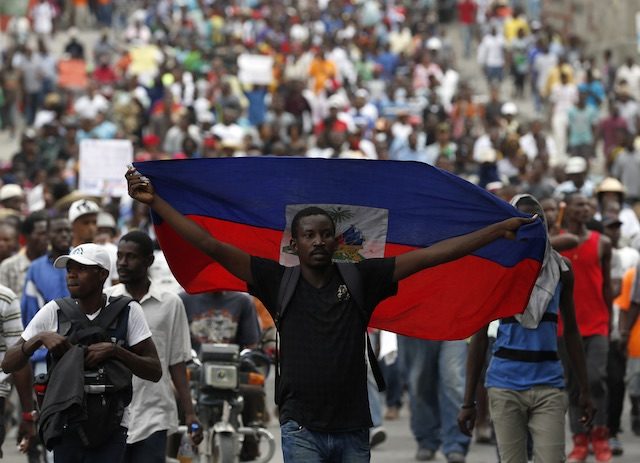SUMMARY
This is AI generated summarization, which may have errors. For context, always refer to the full article.

PORT-AU-PRINCE, Haiti – The head of the Organization of American States’ poll observers in Haiti on Monday, January 25, urged the country’s political camps to get behind efforts to stage an election.
The impoverished Caribbean state had been due to elect a successor to President Michel Martelly in a second-round run-off vote on Sunday, January 24, but polling was called off.
Opposition activists had taken to the street claiming Martelly and his foreign backers are bent on rigging the poll in favor of his chosen candidate.
Martelly is constitutionally prohibited from standing for re-election himself and his legal term in office ends on February 7, when he had hoped to hand over power.
His favored candidate, the previously little-known Jovenel Moise, won October’s first round race with around a third of the vote and remains the favorite.
But opposition flag-bearer Jude Celestin was close behind and refused to campaign ahead of Sunday’s planned vote, alleging the government was working against him.
The international community, especially the United States – which contributed millions of dollars to try to ensure a smooth transition – was dismayed.
But Celso Amorim, the Brazilian diplomat leading the Organization of American States’ observer mission – appealed for compromise from both sides.
“The Provisional Electoral Council (CEP) told us the decision to postpone was for security reasons,” he told Agence France-Presse in an interview.
“But obviously, even if that wasn’t the reason given, I think an un-competitive selection with a single candidate, would have been very problematic, even if it could have been technically legitimate.”
Celestin’s decision to boycott what he dubbed “a selection, not an election” is seen as having stirred the anger of the protesters who burned polling stations.
“Legitimacy and popular assent for the new executive would have been very weak and that would have caused problems that would have been difficult to face,” Amorim said.
“A power vacuum can provoke violence and generate a vicious circle,” he warned.
“I hope we can at least get to the minimum consensus needed to elect representatives with broader legitimacy.”
In the run-up to the failed vote, Haiti’s numerous political factions and stakeholder groups held intense discussions to find a way out of crisis.
But Amorim fears the spirit of compromise was lacking in a country with a patchy history of electoral politics.
“I don’t know all the details but I sense, from what I’ve read and heard, that there was an effort to negotiate a way forward,” he said.
“Were we able to involve all the players that should have taken part in this dialogue? I can’t say.
“Important figures from the economic and political realms were involved, and I think they had this hope,” he added.
“That’s democracy: To understand that one can’t have everything one wants. You must recognize others, make concessions.
“As this country has known very long periods of dictatorship, it’s hard. You need a spirit of reconciliation.
“I’m moderately optimistic – going by what I’m hearing – but I’m not sure we’ll succeed.”
‘Haiti lacks confidence’
A UN stabilization mission has been in Haiti for 12 years and critics of the international presence say the abandoned poll proves it has failed.
But Amorim said not all the blame could be left at the United Nations’ door.
“One can’t and shouldn’t do the Haitians dirty for them.” he argued.
“They need to understand what is needed for democracy: pluralism, different viewpoints, respect for others and fair elections.
“You can’t impose that from outside. You can only ensure favorable conditions to encourage it.
“I think Haiti lacks confidence. What can the international community do? The police can prevent crime but can’t make people love on another.
“The OAS is not here to support the opposition or the government,” he said.
“The problem is one of credibility and only the Haitian people can judge that – not the OAS, the United States or the European Union.” – Amelie Baron, AFP / Rappler.com
Add a comment
How does this make you feel?
There are no comments yet. Add your comment to start the conversation.